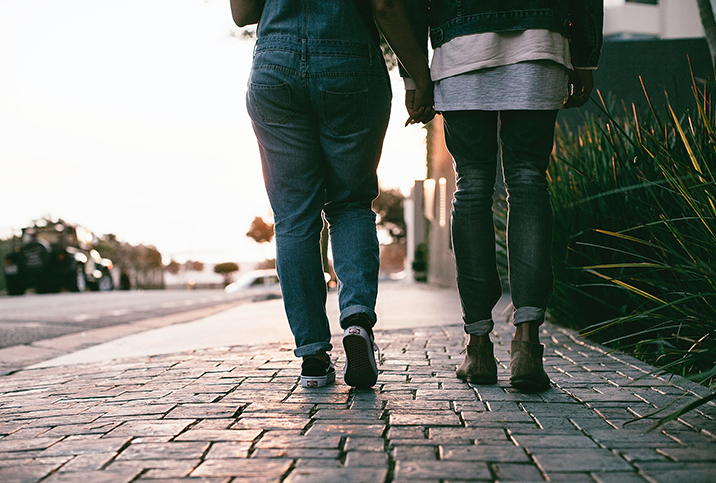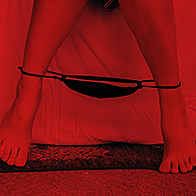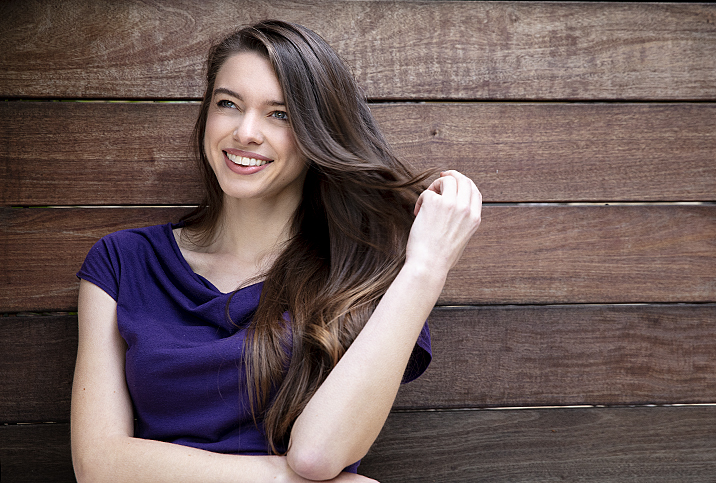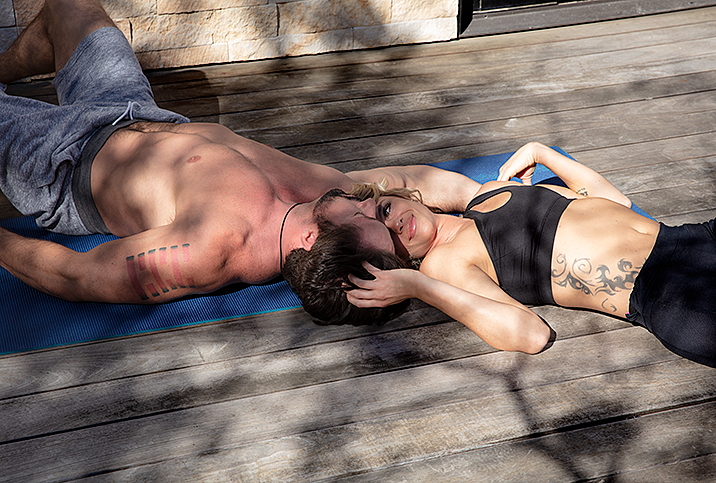The Fate of Pandemic-Era 'Turbo Couples'

When Amelia, 32, met Paul, 40, on their first date at Yard House bar in Dedham, Massachusetts, the usually bustling establishment was quiet—too quiet.
It was March 13, 2020, and Governor Charlie Baker had already declared a state of emergency after COVID-19 cases were detected in the state. In four short nights, Baker would roll out shelter-in-place orders that would force the Yard Bar and virtually all other first-datey spaces to shutter for the then foreseeable future.
Amelia and Paul didn't know that, yet. When they arrived, Paul didn't think twice about going in for a hug, though Amelia did and pulled back.
"I don't think we're supposed to be hugging right now," she told him. Eyeing the empty bar, she added, "I don't even know if we're supposed to be here!"
Apart from initially clashing over pandemic hugging etiquette, the date went well, and the pair of star-crossed lovers made plans to have a follow up-date at a painting studio. They'd only just managed to squeeze in a second date, however, when the world really began to shut down, which precluded the possibility of a third one.
They'd limit their next few dates to going on walks, visiting parks and other "outdoors stuff." Over the course of these initial few outdoorsy dates—even as a pandemic crashed over Massachusetts and the rest of the country—Amelia and Paul began to like each other.
"We were worried we were going to have an even more serious lockdown here in Boston," Amelia recalled. "Since we both lived alone at that time, he asked me if I wanted to isolate together."
Amelia thought he was crazy, saying, "We hadn't even slept together."
But Paul was convincing.
"He proposed that he move in with me for two weeks and bring toilet paper," she said, noting that toilet paper was a hot commodity at the time.
Paul's initial plan to wait out lockdown with Amelia for two weeks turned into living together for three months. That summer, they got an apartment together.
Together, the duo tackled universal pandemic-era challenges, such as reopening Amelia's restaurant and Paul returning to the office. They also navigated trials like taking care of Amelia's mom, who had Alzheimer's, and the death of Paul's dad from COVID-19.
"It was an atypical courtship, but also a good one," Amelia concluded. "We didn't have any of the 20 million games people play. It was just like, we love each other and we're just there for each other and we're going to get through this."
By the fall, they were engaged and eventually married in May 2021. Now, the couple is opening a juice bar together.
Commenting on how swiftly they scurried past relationship milestones and developed an intense relationship, Amelia said it might have taken longer for them to get married had there not been a global pandemic raging around them.
"But a year of quarantine is like five years outside of quarantine," she often jokes.
The rise of the turbo relationship
Amelia might be onto something.
She and Paul weren't the only ones whose relationship was fast-tracked and intensified during the pandemic. The COVID-19 crisis gave rise to the so-called "turbo relationship," a term coined in a June 2020 study by dating site eHarmony and relationship charity Relate. Borne from the pandemic, the turbo relationship is a trend in which partners reach advanced stages of coupledom in relatively short periods of time.
Turns out, many pandemic-borne pairs share Amelia's sentiments.
"Over one-third agree that two months in isolation feels equivalent to two years of commitment, and the same amount say they've reached common relationship milestones, such as moving in together, quicker," researchers found.
You might think whirlwind romances, where participants are compelled by circumstances to accelerate intimacy for the sake of safety and convenience, are doomed to fail. But this hasn't been true for many co-quarantine companions. Of the 2,000-plus turbo partners surveyed, 58 percent said the experience made them realize they want to be with their significant other forever and 63 percent said it strengthened their relationship.
You might think whirlwind romances are doomed to fail. But this hasn't been true for many co-quarantine companions.
"Before the pandemic hit, the speed of how relationships were created had slowed tremendously," said relationship counselor and psychotherapist Bruno Lepore, M.A., LPCS. "People are getting married later and later, and dating longer and longer. But more time doesn't necessarily equal better bonding."
More important than taking cautious, calculated steps or waiting for the perfect person is a willingness to grow together, said Lepore.
"Partners learn to be good partners to each other," he said. "Regardless of whether you find a great partner or a good enough partner, it will become a good enough relationship long-term-wise if they are willing to grow, change and put in the work with you."
Turbo relationship breakups
But even for couples willing to work on their relationship, not all turbo relationships share a happy ending.
"In times of heightened stress, we may feel more connected to those who are on our same page, or disparities can become glaring," said Lauren Ross, a counselor and marriage family therapist. "Someone who may have been neglecting their relationship before the pandemic might either feel reconnected with their partner on the basis of their shared values, or might no longer be able to look past their differences."
Faced with high levels of pandemic-wrought stress and strain, Anne Marie, 40, discovered a few fatal flaws in her relationship with her partner, Forrest. The two had been dating for three months when Anne Marie suggested they move in together to ride out the pandemic while saving on rent. Shortly after the couple signed a lease, Anne Marie lost her job.
"He acted like I'd lost my job on purpose and that I was taking advantage of him," Anne Marie remembered. "He was like Jekyll and Hyde. He just changed, and he started to get really emotionally abusive."
At the same time Anne Marie was let go, someone fraudulently claimed her unemployment benefits.
"It was like being cut off at the knees," she said. "I became basically forced into being dependent on him because I didn't have any income and it's not exactly the easiest thing to do to get work whenever you're with a partner who's emotionally abusive."
Anne Marie endured the abusive cohabitation for six months.
"I tried to make it work, but it just got worse and worse," she said. "But I'm in this position where it's the pandemic. I've lost my job and what else am I going to do?"
She broke up with Forrest after six months. Though they were still awkwardly sharing the same space—he in the living room and she in their bedroom—Anne Marie began dating a new partner, who eventually invited her to move in with him.
Despite her taxing experience, Anne Marie credits the pandemic for helping her realize Forrest was bad news.
"It was kind of like a crash course," Anne Marie said. "If it weren't for the pandemic, I never would have moved in with him. Had I not gotten so close so fast, I wouldn't have known he was a narcissist."
Turbo relationship growing pains
And then, there were couples whose experience fell somewhere in the middle—not quite the "fairy-tale" Amelia described her turbo relationship as, nor the abuse-driven "shit show" like Anne Marie called hers. Couples who, when faced with a choice of allowing pandemic stress to foster disconnection and contempt or learning to communicate in a healthy way and navigate the tumultuous time together, chose the former.
"The pandemic was a wake-up call, and gave couples a chance to really take a look at how they were functioning, paying specific attention to the relationship itself," said relationship therapist Hannah Eubank, M.A., LPC, LMFT from Austin Relational Wellness. "For couples who struggled with finding time to spend together pre-pandemic due to busy jobs and schedules, being forced to physically be together created a shift toward more conversation and communication on a daily basis, resulting in greater intimacy and connection for many."
Such was the case for Nick, 23, and Lyla, 22, two students at San Jose State. Days before California's lockdown went into effect, the duo, who'd already been dating for several years, moved into the studio apartment beneath Nick's mom's house.
"It seemed pretty cool at the beginning," Nick said. "Work was canceled, school was canceled…we were just playing a lot of video games."
"We thought it was like an extra-long spring break," Lyla chimed in.
In July, however, "the fun of it started wearing off," Nick said. Without work or school to escape to, the couple found they had virtually zero time apart.
'I think there is an openness with each other that wasn't present before.'
For better or worse, however, Nick and Lyla didn't have a lot of arguments.
"We weren't really the arguing type," Lyla said. "Instead of consistent arguments, there was this building resentment that all came out at once."
Eventually, the pent-up resentment drove the couple to separate briefly in October, when Lyla moved back in with her parents. Living separately, the two began dating again when restrictions began loosening—cautiously, at first, staying over at the other's place only a day or two out of the week, but eventually moving back in together in the summer of 2021.
Now, the couple shares a one-bedroom apartment in San Jose and has a pet chinchilla named Tsukki. The couple said they've held onto the lessons learned over months of living together in cramped quarters, trying to suppress their issues and needs.
"I think there is an openness with each other that wasn't present before," Nick said. "I was a little more secretive before the pandemic. But I feel a lot more open with Lyla now."
"If one of us had been a little bit more willing to be able to be like, 'I need some super alone time,' then maybe we would have found a solution that wasn't breaking up," Lyla added. "I'm a lot quicker to notice when issues are coming up for me and I can communicate them better now."
"I think there's a tendency to think that if people knew everything about you, they would leave you or not love you anymore," Nick said. "But Lyla is that person, I can tell her all of the weird stuff about me. And she still likes me, I guess."
"I guess," Lyla teased.



















